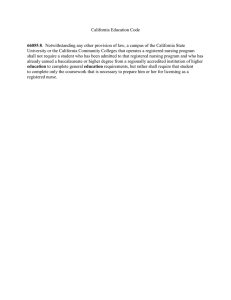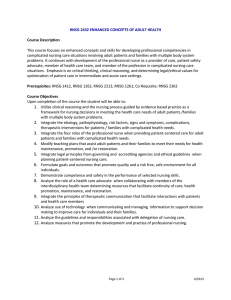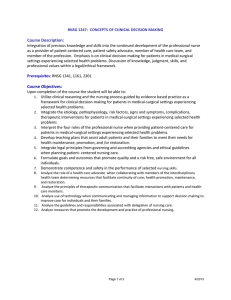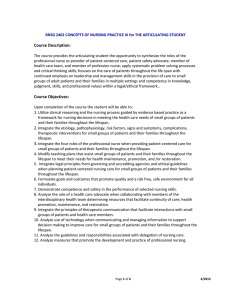RNSG 1517 – CONCEPTS OF NURSING PRACTICE I FOR ARTICULATING... This course provides the articulating student the opportunity to examine... Course Description:
advertisement
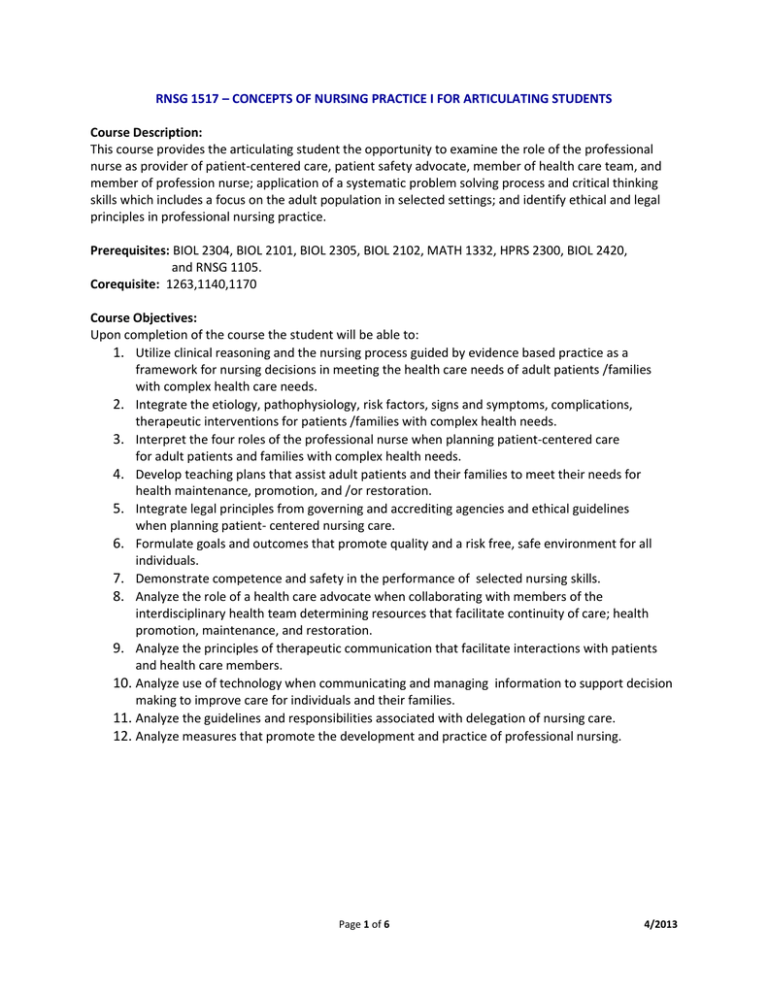
RNSG 1517 – CONCEPTS OF NURSING PRACTICE I FOR ARTICULATING STUDENTS Course Description: This course provides the articulating student the opportunity to examine the role of the professional nurse as provider of patient-centered care, patient safety advocate, member of health care team, and member of profession nurse; application of a systematic problem solving process and critical thinking skills which includes a focus on the adult population in selected settings; and identify ethical and legal principles in professional nursing practice. Prerequisites: BIOL 2304, BIOL 2101, BIOL 2305, BIOL 2102, MATH 1332, HPRS 2300, BIOL 2420, and RNSG 1105. Corequisite: 1263,1140,1170 Course Objectives: Upon completion of the course the student will be able to: 1. Utilize clinical reasoning and the nursing process guided by evidence based practice as a framework for nursing decisions in meeting the health care needs of adult patients /families with complex health care needs. 2. Integrate the etiology, pathophysiology, risk factors, signs and symptoms, complications, therapeutic interventions for patients /families with complex health needs. 3. Interpret the four roles of the professional nurse when planning patient-centered care for adult patients and families with complex health needs. 4. Develop teaching plans that assist adult patients and their families to meet their needs for health maintenance, promotion, and /or restoration. 5. Integrate legal principles from governing and accrediting agencies and ethical guidelines when planning patient- centered nursing care. 6. Formulate goals and outcomes that promote quality and a risk free, safe environment for all individuals. 7. Demonstrate competence and safety in the performance of selected nursing skills. 8. Analyze the role of a health care advocate when collaborating with members of the interdisciplinary health team determining resources that facilitate continuity of care; health promotion, maintenance, and restoration. 9. Analyze the principles of therapeutic communication that facilitate interactions with patients and health care members. 10. Analyze use of technology when communicating and managing information to support decision making to improve care for individuals and their families. 11. Analyze the guidelines and responsibilities associated with delegation of nursing care. 12. Analyze measures that promote the development and practice of professional nursing. Page 1 of 6 4/2013 COURSE CONTENT Module - Overview of Professional Nursing: History of Nursing Roles and Functions of the Nurse Nursing Specialties Module - Legal/Ethical Torts Negligence Malpractice Licensure Texas Nurse Practice Act Board of Nurse Examiners Standards of Professional Practice Unprofessional Conduct Patient Advocacy Module - Psychosocial Need Assessment Coping and Defense Mechanisms Anxiety Nurse/Client Relationship Therapeutic Communication Techniques Health Teaching Psychiatric Principles Cultural Considerations Module - Stress Physiological Responses Interventions Module - Loss, Grief, Death and Dying Grief, Bereavement and Mourning Loss Grief Resolution – Theories Advance Directives End of Life Issues Dying Person’s Bill of Rights Definition of Death Module – Providing Patient-Centered Care for the Male with Urinary and Reproductive Disorders Problems with Prostate: BPH Prostate cancer Prostatitis Page 2 of 6 4/2013 Testicular Cancer Erectile disjunction Renal cancer Urinary diversions Module – Providing Patient-Centered Care for the Individual with a Urinary Disorder Infectious disease Urinary Tract Infection Acute pyelonephritis Interstitial cystitis Obstructive uropathies Urinary calculi including Surgery for calculi Urinary incontinence and Retention Module – Providing Patient-Centered Care for the Individual with a Reproductive Disorder Breast Disorders: Fibrocystic breast Breast Cancer Female Reproductive Disorders: Menstrual Disorders Menopause Pelvic Inflammatory Disease PCOS Problems with pelvic support Cystocele/rectocele Female Cancer Cervical, Endometrial, Ovarian, Vaginal, vulvar Module – Providing Patient-Centered Care for the Individual with a Sexually Transmitted Disease Infection Diseases: STD’s o Chlamydia/ Gonorrhea o Syphilis o Genital Herpes o Genital Warts HIV/AIDS Module – Providing Patient-Centered Care for the Individual with Fluid and Electrolyte Imbalances Fluid Spacing Intake and Output Fluid Volume Deficit Fluid Volume Excess Hypo and Hypernatremia Page 3 of 6 4/2013 Hypo and Hyperkalemia Hypo and Hypercalcemia Module – Providing Patient-Centered Care for the Individual with Cancer Fisk Factors Pathophysiology Manifestations Diagnostic Tests Treatments Module – Providing Patient-Centered Care for the Individual with Pain Pain Experience Physiology Assessment Tolerance vs Dependency Interventions Module – Providing Patient-Centered Care for the Aging Individual Delirium vs Dementia Theories Age Related Physical Changes Alzheimer’s Disease Module – Nursing Care of the Individual with Acid-Base Imbalances Respiratory Acidosis Respiratory Alkalosis Interpreting Arterial Blood Gases Module – Nursing Care of the Individual with Diabetes Type I and Type II Metabolic Acidosis Metabolic Alkalosis Module 18 – Providing Patient-Centered Care for the Individual with a Gastrointestinal Disorder Upper GI: Nausea & vomiting Esophageal disorders GERD Hiatal hernia Stomach Gastritis Peptic ulcer disease Lower GI Diarrhea Fecal incontinence/ Constipation Page 4 of 6 4/2013 Gastroenteritis Peritonitis Intestinal obstruction Diverticulitis, Diverticulosis Hemorrhoids Inflammatory Bowel Disease Crohn’s disease Ulcerative colitis Colostomy Gall Bladder and Pancreas: Cholelithiasis/ Cholecystitis Acute Pancreatitis GI Cancers: Oral Esophageal Gastric Colorectal Module – Providing Patient-Centered Care for the Individual with a Cardiovascular Disorder Hypertension Heart Failure Coronary artery disease Angina Myocardial Infarction Peripheral Artery Disease Disease of lower extremities Raynaud’s Thromnboangiitis obliterans Venous Disorders DVT Thrombophlebitis Module – Providing Patient-Centered Care for the Individual with a Respiratory Disorder Upper Respiratory Influenza Lower Respiratory Pneumonia Fungal infections (brief) Lung Abscess (brief) Head and neck cancer Page 5 of 6 4/2013 Laryngectomy Radical Neck Surgery Lung Cancer Chronic Obstructive Pulmonary Disease Chronic Bronchitis Emphysema Asthma Module - Evidence Based Practice: Nursing Research Research and Theory Evidenced Based Practice Evaluating Research Page 6 of 6 4/2013
